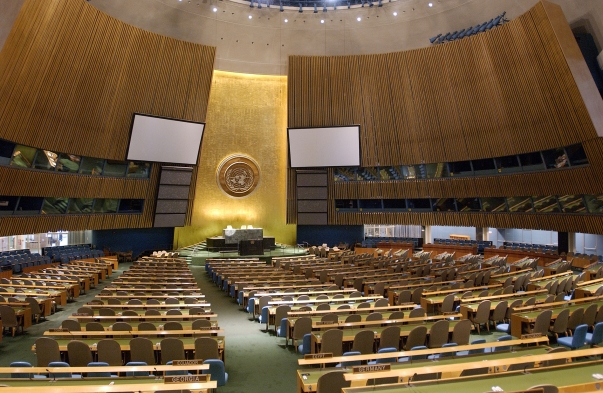Source: news.bahai.org
16 November 2016

UNITED NATIONS — The UN yesterday expressed serious concerns about “severe limits” on the right to freedom of religion or belief in Iran, and specifically about the ongoing persecution of Iranian Baha’is.
The rebuke—the 29th such censure since 1985—came in an annual resolution on human rights in Iran, approved by a vote of 85 to 35 with 63 abstentions by the General Assembly’s Third Committee.
The vote followed a September report by UN Secretary General Ban Ki-moon that said Baha’is “are the most severely persecuted religious minority” in Iran.
Further, a new report on the persecution of Baha’is in Iran was released by the Baha’i International Community on 25 October.
Yesterday’s resolution also expressed concern over Iran’s “alarmingly high” use of the death penalty, its “widespread and systematic use of arbitrary detention,” and the persecution of political opponents, human rights defenders, journalists, and women’s and minority rights activists.
“While Iran has sought to normalize its relations with the world, the passage of this resolution shows that the international community still feels that the human rights situation in the country remains an issue and requires serious attention,” said Bani Dugal, the Principal Representative of the Baha’i International Community to the UN.
“Certainly, in the case of Iranian Baha’is, things have changed for the worse. Among other things, the government has shifted its tactics to more sophisticated and less quantifiable forms of persecution, social, economic, and educational in nature, with the aim of making it harder to document cases of persecution.
“Economic strangulation is also spreading further. Just two weeks ago, for example, the government shut down more than 100 Baha’i shops throughout the country after their owners had closed to observe Baha’i holy days, reflecting one element of severe economic discrimination – as documented in a recent letter to Iranian President Hassan Rouhani,” said Ms. Dugal.
She also noted that the government continues to arrest and imprison Baha’is and that young Baha’is are blocked from attending university.
“Overall, the government’s program against Baha’is amounts to a highly coordinated effort to destroy this community as a viable entity,” she said.
The resolution also called on Iran to cooperate fully with the Special Rapporteur on the situation of human rights in Iran, whose repeated requests to visit Iran have been denied. Ahmed Shaheed, who was the Special Rapporteur on human rights in Iran until 31 October, issued a report in September that took note of an intense anti-Baha’i propaganda campaign waged by the government, saying also that Baha’is continue to be imprisoned and discriminated against economically.
The resolution was introduced by Canada and had 41 co-sponsors.
Leave a Reply